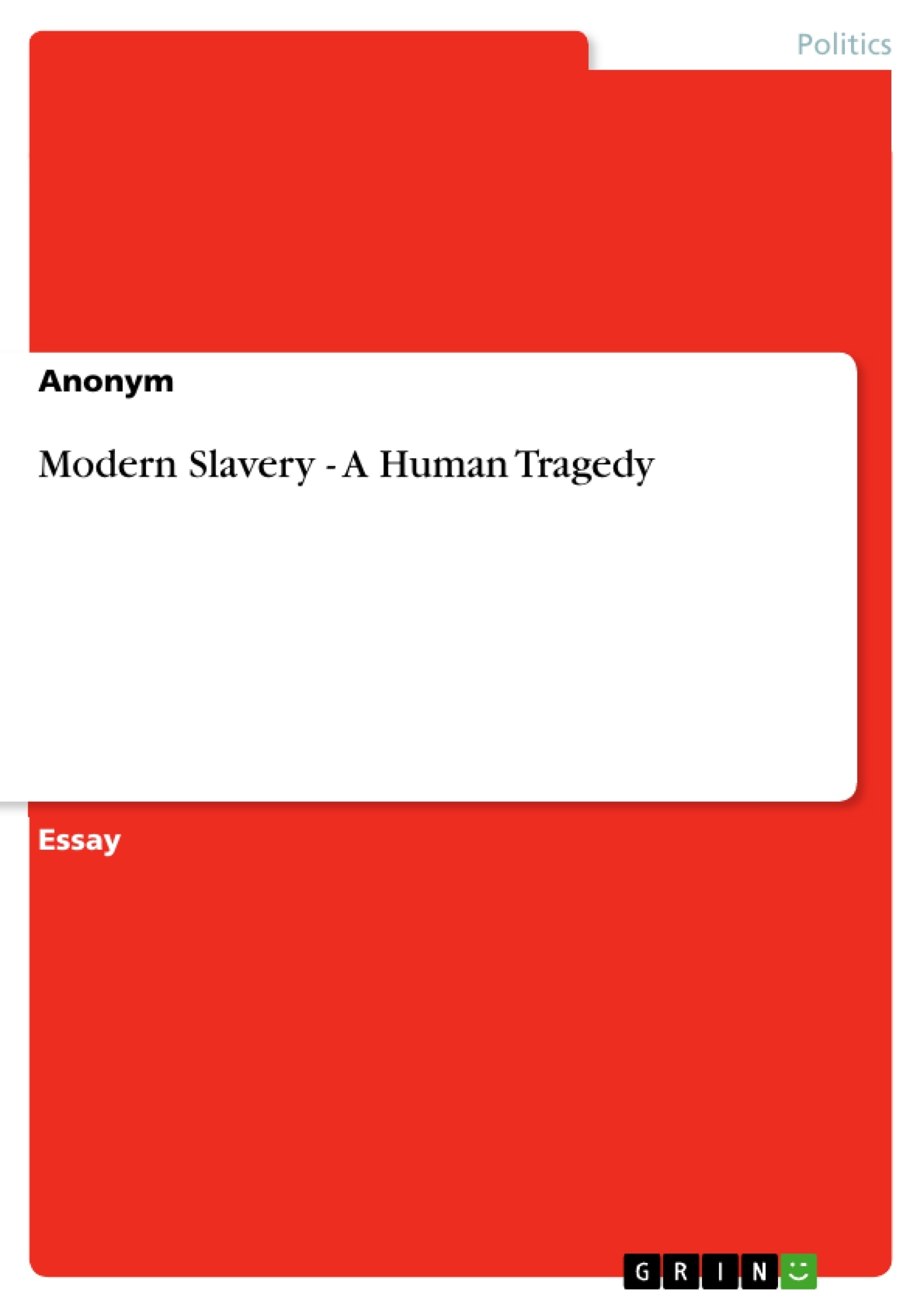Excerpt
Human trafficking – slavery in a globalized world
“The bosses carried weapons. They scared me. I never knew where I was. We were transported every fifteen days to different cities. I knew if I tried to escape I would not get far because everything was unfamiliar. The bosses said that if we escaped they would get their money from our families.”
Congressional testimony of Maria, trafficking survivor from Mexico
(cited in Chen, 2010)
Most people tend to think that slavery is a thing of the past, long gone with the abolition of slavery in the United States in the mid 19th century. People working on cotton fields, punished with whips and food withdrawal, caged into inhumane dwellings, torn apart from their families. However, does the above statement from a Mexican woman sound like anything has changed since those days?
Nowadays, politics and society talk about human trafficking, seemingly giving it a more humane name. But “ Slavery is a booming international trade, less obvious than 200 years ago for sure, but all around us,” (Costa cited in UN news center, 2007). Concrete figures about the amount of human trafficking, including forced labor, sexual trafficking, involuntary domestic servitude, child soldiers and many more can only be estimated since this large business is conducted in the shadows of the underground economy. Likewise, authors like Kevin Bales, who is an expert on modern slavery, have estimated the figures to up to 27 million people while other, more conservative assessments of the International Labour Organization (ILO) speaks of at least 12.3 million victims (Bales, Trodd & Kent, 2009;Belser, de Cock & Mehran, 2005) .
Currently, one can buy a 19-year old slave from West Africa for agricultural use for a mere $40. In comparison, a slave in 1850 cost $43,000, in 2004 dollar terms (Bales, 2005). However, the purchase of slaves is not limited to Africa as one might be inclined to think in regard to the slave trade of the 18th and 19th century, but slaves are bought and sold all over the world. They might be send from Latin America to the United States, from Afghanistan to Iran or from Thailand to Sweden (U.S. Department of State, 2010). Globalization has not only connected the world on a deeper economic basis, but it has made an extensive market for enslaved human beings easier, faster and more difficult to tackle by national authorities.
This paper will consequently give a more detailed account of modern-day slavery and how it has been affected by globalization. Thus, slavery I all its modern forms will be described, illustrated with an example. The term of globalization will have to be defined more thoroughly, in order to understand the connection these two have and consequently the connection will be analyzed. Furthermore, there will be a brief illustration of how modern-day slavery is tackled at the moment. Lastly, a conclusion will be drawn which outlines the findings.
Modern-day Slavery
Bales points out that in the past, being a slave meant that one person legally owned another person, which was documented by ownership certificate (Bales, 2004). The cost of a slave back then was an investment for the owner (around $ 40.000), ensuring that he would do anything in his power to keep this slave alive and at his workplace (ibid.). Modern slavery takes a very different approach, since slavery has been declared illegal all over the world (except for China) and the United Nations' Universal Declaration on Human Rights states in Art.4 that “[n]o one shall be held in slavery or servitude; slavery and the slave trade shall be prohibited in all their forms.“ (UN, 1948). However, this has come to mean that slave-traders “don't ask for a receipt or ownership papers, but they do gain control - and they use violence to maintain this control” (Bales, 2004, p.5).
To understand, how modern slavery works and what its connection to globalization is, it is firstly important to get a more detailed understanding of the definition of slavery in the 21st century. It might be tempting to think of a slave as an African worker on a plantation, but nowadays, slavery can come in all kinds of colors. Yet, the various types of forced labor all have two features in common: “the exercise of coercion and the denial of freedom” (ILO, 2001). Thus, the ILO (1930) has defined forced labor, a term which will be interchangeably used with slavery in this paper, as “[...] all work or service which is exacted from any person under the menace of any penalty and for which the said person has not offered himself voluntarily” (Art. 2.1).
Within this wide definition of slavery, there are certain divisions. Firstly, there is chattel slavery, which closely resembles the old form of slavery where a person is bought or captured and mostly kept in slavery until his death while his[1] children will also become property of the slaveholder. This form of slavery is mostly found in Mauritania where “slavery has a deep cultural acceptance” (Bales, 2004, p. 118) and the courts readily approve of the practice. Secondly, there is contract slavery, where people are lured into contracts and then forced to work in slave-like conditions with the use of force and withdrawal of freedom. The contracts are used to give the illusion of legality. Thirdly, there is debt bondage, today the most common form of slavery. The United Nations 1956 Supplementary Convention on the Abolition of Slavery, the Slave Trade, and Institutions and Practices Similar to Slavery has defined debt bondage as
[...]
[1] I will use the general he as gender neutral, meaning either male or female
- Quote paper
- Anonymous, 2011, Modern Slavery - A Human Tragedy, Munich, GRIN Verlag, https://www.grin.com/document/193428
Publish now - it's free






















Comments